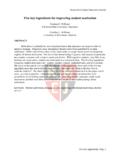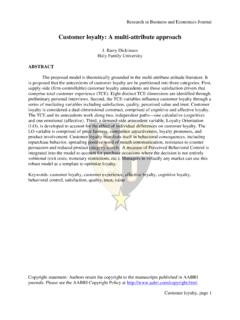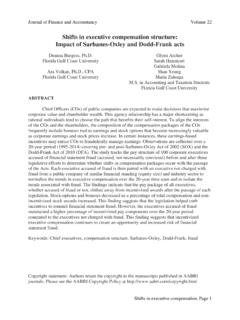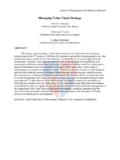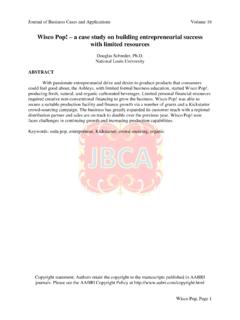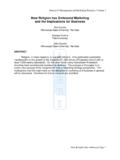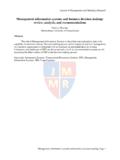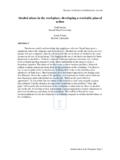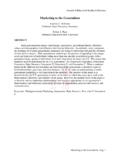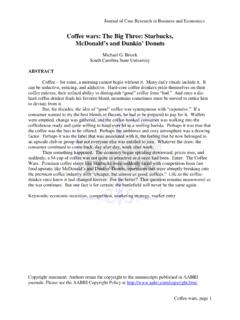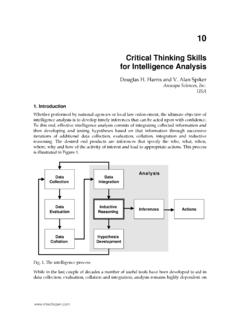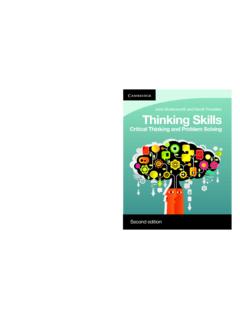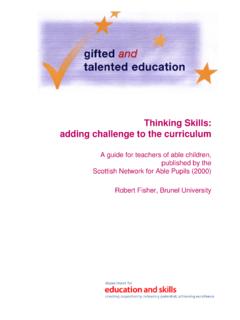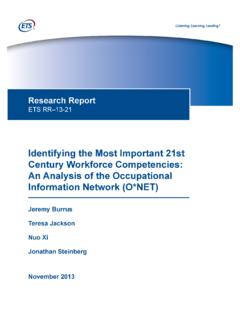Transcription of Professional presence and soft skills: a role for ...
1 Journal of Instructional Pedagogies Professional presence and soft skills : a role for accounting education George Kermis Canisius College Marguerite Kermis Canisius College Abstract Current economic conditions have changed the dynamics of all employment, including accounting, which traditionally has had a supply shortfall. CPA firms are beginning to lay off experienced people for the first time in ten years, while still hiring new staff accountants. The AICPA Vision 2011 Project has added soft skills to the list of core competencies that successful accountants should possess. Therefore, a case can be made that accounting educators have a responsibility to help prepare students to make the transition from unfocused high school seniors to contributing members of a Professional service team.
2 It is incumbent upon accounting educators to prepare students to be competitive in the unfolding economic future. In summary, technical skills are necessary but not sufficient for a successful accounting career that includes an individual's selection, retention and advancement. An incremental laboratory experience was designed to create an environment for soft skill development that does not diminish the attention to accounting theory and technical development. The mandatory experience was added to two required accounting classes starting in the spring of sophomore year. The lab was based on an assessment of needs identified by the profession in a series of interviews and considerations of the Professional development literature. The lab experience includes: (1) Professional Motivation, (2) Emotional intelligence , (3) soft Skill Development, (4) Career skills , and (5) Time Management.
3 These specific skills are grounded in the context of emotional intelligence (Golemon, 2004), which focuses on student s individual responsibility for creating their own Professional futures. This laboratory experience has a dual focus of satisfying the needs of students and the accounting firms that employ them by creating mature professionals able to maximize the contribution they make over their entire career. The experience is designed to have students take ownership of their Professional future early in their accounting education, resulting in their having a satisfying experience in their studies and ultimately, their career. Key Words: Accounting Education, Professionalism, soft skills , Emotional intelligence , AICPA Vision 2011 Project Professional presence and soft skills , Page 1.
4 Journal of Instructional Pedagogies The Case for Professionalism and soft skills in Accounting For years businesses have attempted to analyze top performers and establish criteria on which to base future selection and retention decisions (Bonnstetter, Suiter & Widrick, 2001;. Kouzes & Posner, 2002; Kermis and Kermis, 2008). Since the 1950's, there has also been considerable discussion pertaining to the appropriateness of accounting education in terms of its ability to produce ethically sound leaders (Dosch & Wambsganss, 2006), individuals with excellent soft skills (AICPA, 2008) and individuals with strong emotional intelligence (Kirch, Tucker & Kirch, 2001; Golemon, 2007; Golemon, Boyatzis & McKee, 2004). With the move from GAAP (Generally Accepted Accounting Principles) to IFRS (International Financial Reporting Standards), there is an increased need for accountants with strong soft skills because of IFRS's requirement to apply principles rather than comply with rules.
5 Accountants facing the move to IFRS will need technical training, but their biggest challenge may be mastering the soft skills such as judgment, critical thinking and analysis, integrity and openness, as well as how to make transparent disclosures (Leone, 2008). Leading accounting researchers and partners in major public accounting firms have increasingly called for adjusting accounting education to reflect the realities of the current work environment as another way to create accounting professionals (Beresford, 2005; Wyatt, 2004). Despite these calls to change accounting education to better reflect the demands of today's economic realities and futures, one of the current challenges to the accounting profession is the disconnect between today's group of managers and partners and the propensities of their upcoming employees, the so-called Millenial Generation.
6 It has been stated that the differences in attitudes between this group of new recruits and current supervisory staff and clients are so profound that business, as it is currently conducted, will never be the same again (Smith, 2008). Reasons behind this disconnect include the concept of transition to adulthood held by the current generation of young people and that held by adult society. Adult society holds the role transition to marriage as an essential marker of adulthood. However, adults also hold other character qualities (Arnett, 1998), having strong moral connotations, as distinctly right ways for an adult to be and behave. These qualities include reliability, diligence and impulse control. Emerging adults, on the other hand, emphasize such qualities as accepting responsibility for one's self, making independent decisions and financial independence.
7 Therefore, the characteristics used by emerging adults to denote their transition to full adulthood emphasize individualism, while those used by adult society to denote this transition emphasize teamwork and emotional intelligence . Arnett (1998) defined this process of transitioning from adolescence to full adulthood as emerging adulthood: the process of developing the capacities, skills and qualities of character deemed by their culture as necessary for completing the transition to adulthood (p. 312). This is a time when emerging adults are especially open to the positive impact of training and experience. The period overlaps college students as well as those in the early stages of career building. More than one fifth of 25-year-old Americans still live with their parents, and the definition of adulthood is no longer clear.
8 The full nest syndrome is becoming more common and as a result many emerging adults are free to spend their wages on luxuries without paying rent and assuming the full responsibilities of becoming an adult (Mogelonsky, 1996). This syndrome serves to prolong the period when full adulthood is not achieved. Most entry level accountants fall into this category and are therefore most receptive to programmatic development of their soft skills which can contribute to their maturation. Professional presence and soft skills , Page 2. Journal of Instructional Pedagogies 20% of success in any career is believed to be based on intelligence : the ability to learn, understand and reason. The other 80% is based on the ability to understand oneself and interact with other people (Kirch, Tucker & Kirch, 2001).
9 Successful CEO's are effective leaders, possessing such traits of emotional intelligence as integrity, maturity, business acumen and social skills . Daniel Golemon (2004; Golemon, Boyatzis & McKee, 2004), who coined the terms emotional intelligence and social intelligence , divides emotional intelligence into five components: self-awareness, self-regulation, motivation, empathy and social skills . Training programs have been designed to teach aspects of emotional intelligence . This type of training is a long-term process that requires a commitment by leaders of the organization. Yet competencies in these areas are seldom emphasized in formal education, so if an organization or a profession, such as accounting, leaves soft skill/emotional intelligence issues unaddressed, certain problems will persist (Kirch, Tucker & Kirch, 2001).
10 Furthermore, employers tend to hire staff accountants based primarily on grade point average and a relatively short interview, in which the true aspects of motivation, soft skills and other aspects of emotional intelligence are not elucidated. In interviews of key stakeholders responsible for hiring new accountants (Kermis and Kermis, 2008), certain character traits which are aspects of emotional intelligence , have been found to be lacking in new hires. These include: discretion, independence, patience, work ethic, soft skills , empathy and relationship building. Additional research has found that utilitarian, individualistic and social values are the key motivators to success in the financial industry (Bonnstetter, 2006), defined as the ability to earn more than $500,000 per year. In a practical sense, these individuals want to be in control and make money while helping others with financial solutions.
